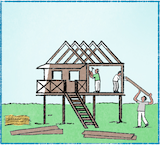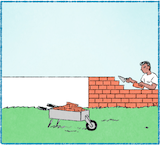


เขากำลังพากันเฮ็ดหญัง เขากำลังพากันส้างบ้านส้างเฮียน หลือว่าเฮ็ดบ้านเฮ็ดเฮียนนั้นหละ
เขากำลังเฮ็ดอยู่จักคน เขากำลังเฮ็ดอยู่สามคน สองคนกะอยู่เทิงเฮียนพุ้นหละ กำลังตอกนั้นตอกนี้ จับนั้นจับนี้ อีกคนหนึ่งกำลังยื่นไม้ขึ้นไป กำลังส่งไม้ขึ้นไปเทิงๆ พุ้นหละ อีกพุหนึ่งกะส่ง อีกพุหนึ่งกะฮับ กำลังส้างบ้านส้างเฮียนอยู่
เขากำลังส้างหนิส้างแล้วไป่ บ่ เขากำลังส้าง กำลังเฮ็ด บ่ทันได้แล้วง่ายดอก หัวกะเฮ็ด หัวกะส้าง
แล้วเขาเฮ็ดเป็นบ้านหญัง เขาเฮ็ดเป็นบ้านไม้ เฮียนไม้ บ่แม่นบ้านปูนดอก มีสองซั้นพุ้นแหล้ว ข้างล่างกะเฮ็ดโล่งโจ่งอยู่ แต่ว่าหม้องคนอยู่สิเทิงๆ หลือว่าอยู่ซั้นสองพุ้นหละวา
12
เขากำลังพากันเฮ็ดหญัง เขากำลังพากันส้างสะพาน หลือว่าเฮ็ดสะพาน
เขาเฮ็ดสะพานเฮ็ดหญัง เขากะเฮ็ดสะพานเพื่อว่าสิเฮ็ดไปข้ามน้ำ หลือว่าข้ามแม่น้ำ
ขั้นบ่มีสะพาน เฮากะบ่สามาดที่สิญ่างข้ามแม่น้ำนี้ไปได้ เพาะว่า น้ำมันกะลึก เพาะสะนั้นแล้วเฮาต้องเฮ็ดสะพาน เพื่อที่ว่าเฮาสิได้ญ่างข้ามแม่น้ำนี้ไปได้
13
เขากำลังเฮ็ดหญัง เขากำลังเฮ็ดฮั้ว หลือว่าส้างกำแพง หลือว่าส้างฮั้วเนาะ
อาดสิเป็นฮั้วบ้าน กำแพงบ้านกะได้
เขากำลังเฮ็ดอยู่พุเดียวข้อหล้อ บ่มีฮอดคนซ่อยเฮ็ด
เขาเฮ็ดเป็นกำแพงอี่หยัง เขาเฮ็ดเป็นฮั้วอี่หยัง เขากะเฮ็ดเป็นฮั้วปูน เขาใซ้ปูนมาเฮ็ดให้เป็นฮั้ว
ฮั้วนี้เฮ็ดเป็นไม้ได้บ่ กะได้อยู่ บางคน หลือว่าลังคนกะเฮ็ดเป็นฮั้วไม้ บางคนกะเฮ็ดเป็นฮั้วปูน แล้วแต่คนมัก แล้วแต่คนอยากสิเฮ็ด
Link to overview page
Link to dictionary
| Isaan | Pronunciation | Tones | Thai | English/Notes |
|---|---|---|---|---|
| เขา | khao | M | เขา | personal pronoun: he, she |
| กำลัง | gam-laŋ | M-HR | กำลัง | auxiliary indicating continuous or progressive action |
| พา | pha: | HR | พา | 1. to guide, to lead, to accompany {หมา: พามันไปเหล้น = dog: [I] took/brought him to play} 2. plural marker for verbs, to be doing sth. together {เขาพากันใส่ส้ง = they are all wearing trousers} {เขากำลังพากันเฮ็ดหญัง เขากำลังพากันส้างบ้านส้างเฮียน = What are they doing? They're building a house.} |
| กัน | gan | M | กัน | mutual, each other, with another, together {เขากำลังนั่งเว้ากัน = they're sitting and talking} {เขาสองคนฮักกัน = they love each other} {ปาสองโตนี้ ใหญ่ห่างกันหลายบ่ = These two fish here, are they very different in size (from each other)?} {ต่างกัน = to be different (from each other)} {ก่องอันไหนหนักกว่ากัน = Which box is heavier (than the other(s))?} |
| เฮ็ด | het | H | ทำ | to do, to make |
| หญัง | ɲaŋ | M | อะไร, เป็นหญัง = ทำไม | 1. what {เขากำลังเฮ็ดหญัง = What is he doing?} {ธูปเอาไว้เฮ็ดหญัง = What are incense sticks for?} 2. something, anything, (nothing) 3. เป็นหญัง[...]คือ in initial position: why {เป็นหญังเขาคือใส่บักพิกลงไปในกวยเตียว = Why is he putting chili in [his] noodle soup?} {เป็นหญังหน้าต่างมันคือเปิด = Why is the window open?} {เป็นหญังมันคือมีควนไฟ = Why is there smoke?} |
| ส้าง | sa:ŋ | LF | สร้าง | to build {ส้างบ้านส้างเฮียน = to build a house} |
| บ้าน | ba:n | HF | บ้าน | 1. house, home 2. village (also used as a prefix before the name of a village) 3. home country, home region {บ้านเฮาเฮ็ดเข้าจั่งใด = How do we plant rice in Isaan/Thailand?} |
| เฮียน | hi:an | HR | เรือน | house, home |
| หลือ | lʉ: | M | หรือ | or |
| ว่า | wa: | H | ว่า | 1. that, as {คำว่า X = the word X} 2. to say |
| นั้นหละ | nan-la | HF-M | นั่นแหละ | auxiliary for emphasis at the end of a phrase |
| อยู่ | yu: | H | อยู่ | 1. to be (located) at 2. yet, still 3. auxiliary indicating continuous or progressive action {ทอดปาอยู่ในกะทะ = (in the process of) frying a fish in the pan} {แม่กำลังเมี้ยนเฮียนอยู่ = mother is cleaning/tidying up the house} |
| จัก | jak | M | จัก | 1. answer to a question: [I] don't know, don't know exactly, [I'm] not sure {พุซายคนนี้เขาเถ้าไป่ จัก จักเถ้าหลือบ่เถ้า เบิ่งบ่ค่อยออก = Is this man here already old? I don't know. I can't see clearly whether he's old or not.} {เขาเว้ากันอยู่ใส จักคือกัน = Where are they talking? I don't know either.} 2. exact(ly), what exactly {จักต้มอี่หยังกะบ่ฮู้ = I don't know what (exactly) he is cooking} {บ่ลู้คือกันจักปาอี่หยัง = I don't know either what kind of fish this is} 3. how much/many? {ต้นไม้มีจักต้น = How many trees are there?} {ตอนนี้จักโมงแล้ว = What time is it now?} {มือของเฮานี้สิมีจักนิ้ว = How many fingers do our hands have?} 4. a bit, a little bit {จักหน่อย/จักหน่อยหนึ่ง = a bit, a little bit} |
| คน | khon | HR | คน | person, people |
| สาม | sa:m | M | สาม | three |
| สอง | sɔ:ŋ | M | สอง | two |
| กะ | ga | M | ก็ | 1. then, consequently 2. also |
| เทิง | thə:ŋ | HR | บน | 1. on, on top of, at, in {เทิงโต่ะ = at/on the table} {กบมันนั่งอยู่เทิงใบบัว = the frog is sitting on the lotus leaf} {เทิงท้องฟ้า = in the sky} {มันแล่นอยู่เทิงลาง = [the train] runs on rails} {มีคนนั่งอยู่เทิงลดสามล้อสามคน = there are three people sitting in the tuk tuk} 2. up, upward Notes: pronunciation: also realized as ทัง |
| พุ้นหละ | phun-la | HF-M | นู่นแหละ | auxiliary for emphasis at the end of a phrase Notes: see also พุ้นหนะ |
| ตอก | tɔ:k | LF | ตอก | 1. to hammer, to hit 2. egg: to knock open |
| นั้น | nan | HF | นั้น | that, there |
| นี้ | ni: | HF | นี้ | 1. this 2. here |
| จับ | jap | M | จับ | 1. to grasp, to hold {เขาจับมือกัน = they're holding hands} {เขายืนจับไอติมอยู่ = she's standing, holding an ice cream} 2. to catch, to arrest {จับพุล้าย = to arrest a criminal} |
| อีก | i:k | LF | อีก | 1. more, again 2. other, another |
| หนึ่ง | nʉŋ | H | หนึ่ง | 1. one 2. after adjective: intensifier {บักคักหนึ่ง = very much} {อันบักใหญ่หนึ่ง = very large}, or attenuates the meaning {กะดาดมันแผ่นน้อยๆ หนึ่ง = the piece of paper is [relatively] small} |
| ยื่น | yʉ:n | H | ยื่น | to hand sth. to so., to stretch out one's hand, to reach out for {เขากะสิยื่นแตงโมให้พุซายกิน = she hands the boy watermelon to eat} |
| ไม้ | mai | HF | ไม้ | wood, tree |
| ขึ้น | khʉn | LF | ขึ้น | 1. to go up, to increase 2. sun: to rise {ตะเว็นกำลังขึ้น = the sun is rising} 3. more 4. bus/train etc.: to get on, to board {พุโดยสานขึ้นลดไฟเบิดแล้ว = all passengers have boarded the train} |
| ไป | pai | M | ไป | 1. to go 2. auxiliary indicating action extending into the future |
| ส่ง | soŋ | H | ส่ง | 1. to send 2. to give, to hand sth. (over), to pass 3. to bring so., e.g., to their destination {ลดปะจำทางคันนี้สิแล่นไปส่งพุโดยสาน = the bus brings the passengers to their destinations} 4. to emit (e.g., a smell, noise) {ส่งเสียง = to make a noise} |
| พุ | phu | H | ผู้ | 1. person 2. clf. for people {พุหญิงพุหนึ่ง พุซายพุหนึ่ง = a woman, a man} {ซู่พุซู่คน = everybody} {พุหนึ่งโตจ่อยๆ พุหนึ่งโตบักอ้วนหนึ่ง = one person is slim, the other is fat} Notes: pronunciation: also realized as พู่- |
| ฮับ | hap | H | รับ | 1. to receive, to obtain, to get 2. to catch {ฮับลูกบอน = to catch a ball} Notes: see also ลับ |
| หนิ | ni | M | นี่แหละ, เหรอ/หรอ | 1. particle used to emphasize a statement or form (or add to) a question {เป็นตาแซบคือหญังหนิ = it's really tasty} {เคี่ยงพอเท่าๆ หนิ = the [radio] is appropriately sized (i.e., not too large)} 2. variant of นี้ = this Notes: translation to be determined; maybe sometimes like Thai นี่แหละ; other examples given: อยู่ใสหนิ อยู่ตลาดหนิ กินเข้าไป่หนิ |
| แล้ว | lɛ:o | HF | แล้ว | 1. finished 2. already 3. and then, and next (especially แล้วกะ) 4. auxiliary for past tense |
| ไป่ | pai | H | หรือยัง | question particle: yet {เขาข้ามสะพานไป่ = Has he crossed the bridge yet?} {เขากินเข้าแล้วไป่ = Has he finished eating yet?} {กินเข้าไป่? บ่ทันกิน = Have you eaten yet? Not yet.} |
| บ่ | bɔ: | H | ไม่ | 1. no, not 2. question particle, transforming a statement into a question Notes: spelling exception in line with common usage on social media |
| บ่ทันได้ | bɔ:-than-dai | H-HR-HF | ยังไม่ได้ | not, not yet {บ่ทันได้กินเข้า = [I] haven't eaten yet} {อายุบ่ทันได้หลาย = not yet old} {เขาอาดสิบ่ทันได้เถ้ากะได้ = maybe he's not yet (that) old} Notes: see also ทันได้ which is apparently equivalent |
| ง่าย | ŋa:i | H | ง่าย | easy, simple, clear |
| ดอก | dɔ:k | LF | หรอก, ดอก | 1. particle used after a negative, relativizing or explanatory statement to make the sense milder {กินเข้าบ่ บ่กินดอก = Are you going to eat [with us]? No.} {เป็นก้อนสี่เหลี่ยม ก้อนน้อยๆ ดอก = These are cubes, small cubes.} {แล้วกะมีลดคันหนึ่งขี่ผ่านมา เป็นลดเก็งดอก = And there's a car passing, a sedan.} 2. particle used to emphasize (not necessarily a negative) contrast 3. particle used for emphasis {ดอกไม้นี้งามบ่ กะงามอยู่ เบิ่งงามๆ ดอก = Is this flower beautiful? Yes, it's beautiful, it looks beautiful} |
| หัว | hu:a | M | เพิ่ง | just, just now, only just {คนที่หัวกะเคยพ้อกัน = someone [we've] just met} {หัวกะตื่น = [I've] just woken up} {หัวกะซักมา = [the shirt has] just [been] washed} |
| เป็น | pen | M | เป็น | 1. to be, to exist 2. to be able to 3. to suffer, sth. happens to 4. เป็นหญัง[...]คือ in initial position: why? {เป็นหญังเขากะคือแปงฟัน = Why is he brushing his teeth?} {เป็นหญังเคี่ยงบินมันคือสิตก = Why is the airplane falling down?} |
| บ่แม่น | bɔ:-mɛ:n | H-H | ไม่ใช่ | 1. not {เขาเป็นพุหญิง เขาบ่แม่นพุซาย = she's a woman, she's not a man} 2. no |
| ปูน | pu:n | M | ปูน | cement {บ้านปูน = house with stone walls, as opposed to บ้านไม้} |
| มี | mi: | HR | มี | 1. to have 2. there is |
| ซั้น | san | HF | ชั้น | 1. floor, shelf, step of a staircase {ซั้นเก็บเสี้ยผ้า = clothes shelf} {ซั้นวางหนังสือ = book shelf} 2. level, grade, class {ซั้นมอสี่ = secondary school grade four} 3. layer |
| พุ้นแหล้ว | phun-lɛ:o | HF-LF | นู่นแหละ | auxiliary for emphasis at the end of a phrase Notes: variant of พุ้นหละ |
| ข้างล่าง | kha:ŋ-la:ŋ | LF-H | ข้างล่าง | below, beneath, down, downward |
| โล่งโจ่ง | lo:ŋ-jo:ŋ | H-H | ว่างเปล่า | empty |
| แต่ว่า | tɛ:-wa: | H-H | แต่ว่า | 1. but 2. only {ฮู้แต่ว่าเขายืนอยู่พุเดียว = I only know that he's standing there by himself} |
| หม้อง | mɔŋ | LF | ที่, แห่ง, บริเวณ | 1. place, area {หลายที่หลายหม้อง = in many places} {หม้องใดหม้องหนึ่ง = some place} 2. clf. for places |
| สิ | si | M | จะ | future tense auxiliary {เขากำลังสิตื่น = he's about to wake up} {สิไปตะหลาด = [I'm] going to the market} |
| วา | wa: | HR | final particle | |
| สะพาน | sa-pha:n | M-HR | สะพาน | bridge |
| เพื่อ | phʉ:a | H | เพื่อ | for Notes: the vowel เอือ is likely to be a Thai loan; pronunciation: also realized as เพี่ย |
| ข้าม | kha:m | LF | ข้าม | to cross {ข้ามสะพาน = to cross a bridge} {ข้ามทะเล = to cross the sea} |
| น้ำ | na:m | HF | น้ำ | 1. water 2. drink, soft drink, juice |
| แม่น้ำ | mɛ:-na:m | H-HF | แม่น้ำ | river |
| ขั้น | khan | LF | เมื่อ | when, if |
| เฮา | hao | HR | เรา | 1. personal pronoun: we 2. personal pronoun: I |
| สามาด | sa:-ma:t | M-HF | สามารถ | can, to be able |
| ที่ | thi: | H | ที่ | 1. that, which {คนที่ยืนอยู่ฝั่งขวา = the person which is standing on the right = the person standing on the right} {เว้าคำที่บ่สุพาบ = to speak words which are impolite = to speak impolitely} 2. for ordinal numbers {ที่สาม = third} |
| ญ่าง | ɲa:ŋ | H | เดิน | to walk {เขากำลังญ่างเว้ากัน = they are walking and talking} {ลูกเป็ดญ่างไปนำแม่เป็ด = the ducklings are [walking] following their mother} {เขากำลังญ่างข้ามสะพาน = she's walking over the bridge} {เขาสิญ่างไปใส = Where is he going?} |
| ได้ | dai | HF | ได้ | 1. can 2. to get, to obtain 3. before verb: indicating past tense 4. บ่ได้ + verb: not |
| เพาะว่า | phɔ-wa: | H-H | เพราะว่า | because |
| มัน | man | HR | มัน | it (also used to refer to people) |
| ลึก | lʉk | H | ลึก | deep |
| เพาะสะนั้นแล้ว | phɔ-sa-nan-lɛ:o | H-M-HF-HF | เพราะฉะนั้นแล้ว | therefore, for that reason, consequently Notes: pronunciation: also realized as เพาะฉะนั้น |
| ต้อง | tɔŋ | HF | ต้อง | to have to, must |
| เพื่อที่ | phʉ:a-thi: | H-H | เพื่อที่ | in order to, so that Notes: the vowel เอือ is likely to be a Thai loan |
| ฮั้ว | hu:a | HF | รั้ว | 1. fence 2. wall |
| กำแพง | gam-phɛ:ŋ | M-HR | กำแพง | wall |
| เนาะ | nɔ | H | เนาะ | final particle: makes the statement softer, looking for agreement |
| อาด | a:t | LF | อาจ | 1. might, may, will 2. likely |
| พุเดียว | phu-di:ao | H-M | คนเดียว | 1. alone, by oneself {เขากำลังยืนอยู่พุเดียว = she's standing by herself} {เขานั่งอยู่พุเดียว = he's sitting by himself} 2. one person |
| ข้อหล้อ | khɔ:-lɔ: | LF-LF | เท่านั้น, ขนาดนั้น, น้อยๆ | only {ต้นไม้มีต้นเดียว ต้นเดียวข้อหล้อ = there's one tree, only one tree} {มีบ้านหลังเดียวข้อหล้อ = there's only one house} |
| ฮอด | hɔ:t | HF | ถึง | 1. to arrive, to attain {ฮอดจุดหมายปายทาง = (airplane, train etc.) to arrive at one's destination} {มันทันได้ฮอดหกโมงอยู่ = it's not yet 6 o'clock} 2. to, at {ผมญาวฮอดบ่าไหล่เอาโลด = long hair down to the shoulders} 3. about {บ่ได้เว้าฮอด = [I] haven't talked about [this]} {คนที่เฮาเว้าฮอดวั่งหั้นหละ = the person we've just talked about} |
| ซ่อย | sɔ:i | H | ช่วย | to help, to assist {ขอบใจเด้อที่มาซ่อย = Many thanks for your help!} |
| อี่หยัง | i:-yaŋ | H-M | อะไร | 1. what {นี้คืออี่หยัง = What is this?} {มื้อนี้เจ้าเฮ็ดอี่หยัง = What are you doing today?} {กินเข้างายกับอี่หยัง = What did you have for breakfast?} 2. something, anything, (in negations) nothing {บ่ต้องเฮ็ดอี่หยังอีกเลยนอกจากใส่ปุย = [we] don't need to do anything besides adding fertilizer} |
| ใซ้ | sai | HF | ใช้ | to use |
| มา | ma: | HR | มา | 1. to come 2. auxiliary expressing action towards the present or focal time {กะคุเฮ็ดมาจากอี่หยัง = What is the bucket made of?} {แล้วเขากะเก็บเงินจากพุนั้นมา = and then she takes the money of that person} |
| ให้ | hai | LF | ให้ | 1. to give {หมอกำลังเอายาให้คนป่วยกิน = the doctor is giving the patient medicine} 2. for 3. to allow, to be allowed |
| บาง | ba:ŋ | M | บาง | 1. some {สัดบางโตบ่มีขา = some animals don't have legs} {บางคนสิมักกินกวยเตียวแทนเข้า = some people like to eat noodle soup instead of rice (dishes)} {บางสิ่งบางอย่าง = something, anything} 2. thin |
| ลัง | laŋ | HR | บาง | some {ควยลังโตกะบ่มีเขา ควยลังโตกะมีเขา = some buffaloes don't have horns, some have horns} {ลังเที่ย = sometimes} |
| แล้วแต่ | lɛ:o-tɛ: | HF-H | แล้วแต่ | up to, depending on |
| มัก | mak | H | ชอบ | to like, to love, to want, to desire |
| อยาก | ya:k | LF | อยาก | to want, to wish |